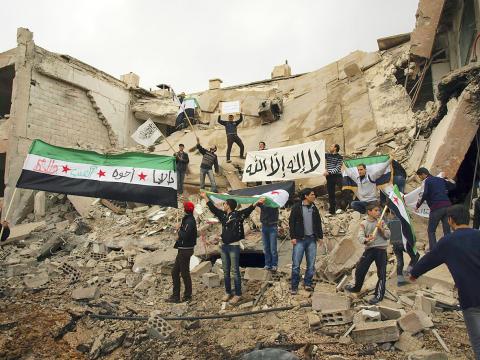Syrian rebels fighting to topple Syrian President Bashar al-Assad set their sights on Friday on the capital’s international airport in a bid to cut off the regime’s supplies, clashing with government troops nearby and again forcing the closure of the airport road.
A fighter who is part of the push against Damascus International Airport declared it a legitimate target, claiming that the regime has stationed troops and elite forces there, as well as military planes that transport ammunition.
Losing control of the airport would be a major blow to the regime, which has recently lost two air bases near the capital.

Photo: Reuters
It was unclear just how close to the airport, a few kilometers south of the capital, the battles reached. Fighting has intensified in the past week in the southern districts of the Syrian capital and its suburbs.
“The rebels have made major military gains, and have been fighting closer to the regime’s nerve center, which is the airport, for days, systematically chipping away at the political and military power off the Assad regime,” said Fawaz Gerges, head of the Middle East Center at the London School of Economics.
The clashes around Damascus, a city of 1.7 million, have already forced the suspension of commercial flights over the past week, although airport officials insist the facility remains open and was functioning normally on Friday.
Rebels said they were targeting the airport in an effort to cut military supplies to the government.
“This would send a very strong political message to the regime. It will be a moral victory, to say the least,” said the fighter, who gave only his first name, Nour, for security reasons. “The battle to cut off the regime supplies from the airport has started.”
Another rebel, speaking on condition of anonymity for the same reason, said the airport was now considered a “military zone.”
“We urge civilians to stay away,” said the rebel, a member of the Damascus area military command involved in Friday’s fighting.
Iran and Russia are widely believed to be supplying the al-Assad regime with weapons through the airport.
Tehran has not given details of its direct military aid to al-Assad’s regime, but has acknowledged that Revolutionary Guard envoys have been advisers in the past.
Moscow has rejected Western sanctions against al-Assad’s regime and said it would honor earlier signed weapons contracts with Syria for the delivery of anti-shipping and air defense missiles. The Kremlin insists that the Russian arms sales do not violate any international agreements.
At talks in Belfast, Northern Ireland, US Secretary of State Hillary Rodham Clinton said on Friday that the US and Russia were committed to trying again to get al-Assad’s regime and the rebel opposition to talk about a political transition, setting aside a year-and-a-half of US-Russian disagreements that have paralyzed the international community.
However, Clinton said that the US would insist once again that al-Assad’s departure be a key part of that transition, a position not shared by the Russians.
On Friday, Syrian government forces were firing rockets and mortars at suburbs south of Damascus amid heavy clashes with rebels, according to activists. Most of the fighting was taking place in the towns of Aqraba and Beit Saham near the airport.

MONEY GRAB: People were rushing to collect bills scattered on the ground after the plane transporting money crashed, which an official said hindered rescue efforts A cargo plane carrying money on Friday crashed near Bolivia’s capital, damaging about a dozen vehicles on highway, scattering bills on the ground and leaving at least 15 people dead and others injured, an official said. Bolivian Minister of Defense Marcelo Salinas said the Hercules C-130 plane was transporting newly printed Bolivian currency when it “landed and veered off the runway” at an airport in El Alto, a city adjacent to La Paz, before ending up in a nearby field. Firefighters managed to put out the flames that engulfed the aircraft. Fire chief Pavel Tovar said at least 15 people died, but

LIKE FATHER, LIKE DAUGHTER: By showing Ju-ae’s ability to handle a weapon, the photos ‘suggest she is indeed receiving training as a successor,’ an academic said North Korea on Saturday released a rare image of leader Kim Jong-un’s teenage daughter firing a rifle at a shooting range, adding to speculation that she is being groomed as his successor. Kim’s daughter, Ju-ae, has long been seen as the next in line to rule the secretive, nuclear-armed state, and took part in a string of recent high-profile outings, including last week’s military parade marking the closing stages of North Korea’s key party congress. Pyongyang’s official Korean Central News Agency (KCNA) released a photo of Ju-ae shooting a rifle at an outdoor shooting range, peering through a rifle scope

South Korea would soon no longer be one of the few countries where Google Maps does not work properly, after its security-conscious government reversed a two-decade stance to approve the export of high-precision map data to overseas servers. The approval was made “on the condition that strict security requirements are met,” the South Korean Ministry of Land, Infrastructure and Transport said. Those conditions include blurring military and other sensitive security-related facilities, as well as restricting longitude and latitude coordinates for South Korean territory on products such as Google Maps and Google Earth, it said. The decision is expected to hurt Naver and Kakao

India and Canada yesterday reached a string of agreements, including on critical mineral cooperation and a “landmark” uranium supply deal for nuclear power, the countries’ leaders said in New Delhi. The pacts, which also covered technology and promoting the use of renewable energy, were announced after Indian Prime Minister Narendra Modi and Canadian Prime Minister Mark Carney hailed a fresh start in the relationship between their nations. “Our ties have seen a new energy, mutual trust and positivity,” Modi said. Carney’s visit is a key step forward in ties that effectively collapsed in 2023 after Ottawa accused New Delhi